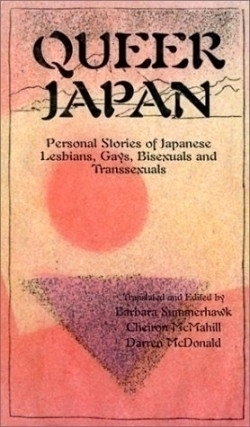
Queer Japan
“The first time I ever fell in love with someone was in my first year of junior high. It was a girl in my class, and even after coming home from school I would think of her and long to touch her. But I kept my feelings hidden because I thought if she knew how I felt she would tell me, ‘That’s disgusting. You are a pervert.’” This passage speaking of one’s first heart warmings mixed with the anxiety of feeling “dirty” could have come from any young girl’s diary who was just coming to terms with her lesbianism. It comes from “A Young Woman’s Story,” one of many personal stories told in this book about dealing with one’s discovery of sexuality. The only distinct difference in this story is that it is being told by a Japanese woman facing her sexuality issues in her mother country, Japan.
Readers wanting to read about the differences Japanese women and men facing the coming to terms and “coming out” with their sexuality will find that if it weren’t for the Japanese names and words they could be written by any gay/lesbian/bisexual here in the United States.
If those that compiled and translated this book set out to remind us everything is relative then this book definitely accomplished their goal. If they set out to impress upon us that “coming out” in the Japanese culture is somehow different than here in the United States, then I believe they missed their mark. For those readers not informed about the Japanese culture the stories included do not provide enough information and description of this culture to allow us to place the personal story (which is often more introspection than environmental) in its proper context to extrapolate the writer’s true experience.
The editors do try to provide a historical basis in the introduction of the book, and several stories provide references to political involvement and growth throughout their context. The reader does become familiar with the political fight for rights, the groups involved and the court battles that the gay/lesbian/transsexual/bisexual Japanese community has experienced.
Certainly any book where people so openly share their struggles in life for love, acceptance, and human rights and dignity as a minority is worth reading. Queer Japan is one such book.
Reviewed by
Michele McDonald
Disclosure: This article is not an endorsement, but a review. The publisher of this book provided free copies of the book to have their book reviewed by a professional reviewer. No fee was paid by the publisher for this review. Foreword Reviews only recommends books that we love. Foreword Magazine, Inc. is disclosing this in accordance with the Federal Trade Commission’s 16 CFR, Part 255.
